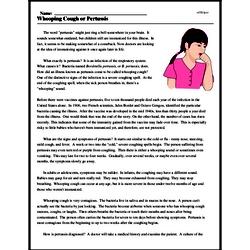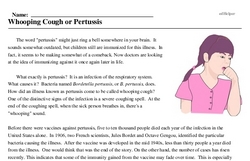Whooping Cough or Pertussis
The word "pertussis" might just ring a bell somewhere in your brain. It sounds somewhat outdated, but children still are immunized for this illness. In fact, it seems to be making somewhat of a comeback. Now doctors are looking at the idea of immunizing against it once again later in life.
What exactly is pertussis? It is an infection of the respiratory system. What causes it? Bacteria named Bordetella pertussis, or B. pertussis, does. How did an illness known as pertussis come to be called whooping cough? One of the distinctive signs of the infection is a severe coughing spell. At the end of the coughing spell, when the sick person breathes in, there's a "whooping" sound.
Before there were vaccines against pertussis, five to ten thousand people died each year of the infection in the United States alone. In 1906, two French scientists, Jules Bordet and Octave Gengou, identified the particular bacteria causing the illness. After the vaccine was developed in the mid 1940s, less than thirty people a year died from the illness. One would think that was the end of the story. On the other hand, the number of cases has risen recently. This indicates that some of the immunity gained from the vaccine may fade over time. This is especially risky to little babies who haven't been immunized yet, and therefore, are not protected.
What are the signs and symptoms of pertussis? It starts out similar to the cold or flu - runny nose, sneezing, mild cough, and fever. A week or two into the "cold," severe coughing spells begin. The person suffering from pertussis may even turn red or purple from coughing. Then there is either a whooping sound or sometimes even vomiting. This may last for two to four weeks. Gradually, over several weeks, or maybe even over several months, the symptoms slowly go away.
In adults or adolescents, symptoms may be milder. In infants, the coughing may have a different sound. Babies may gasp for air and turn really red. They may become exhausted from coughing. They may stop breathing. Whooping cough can occur at any age, but it is more severe in those under twelve months of age and those who weren't immunized.




